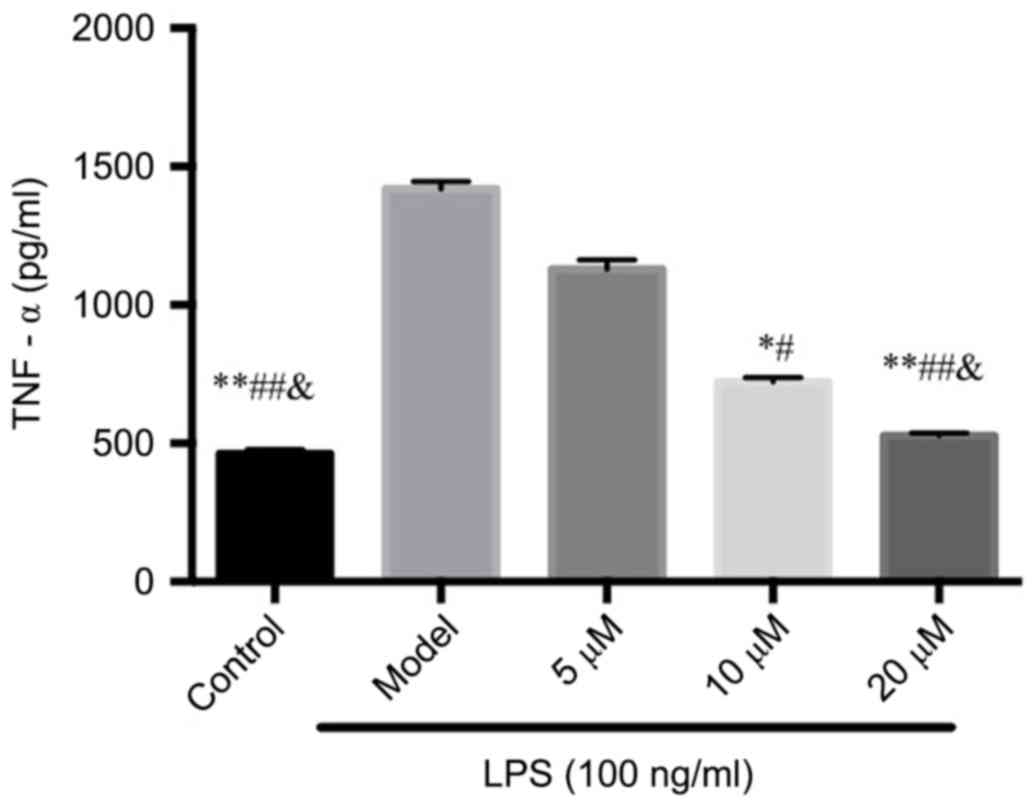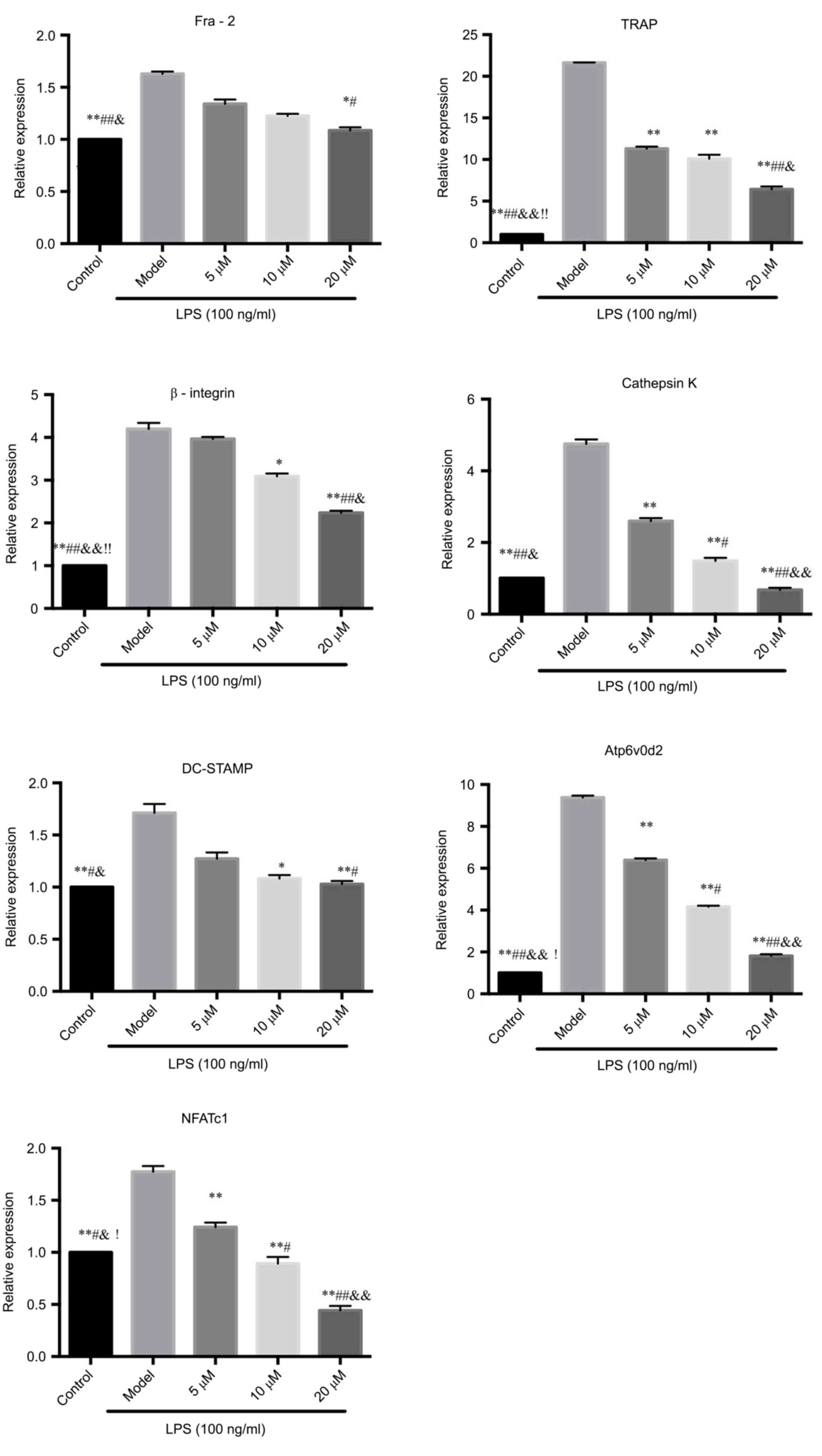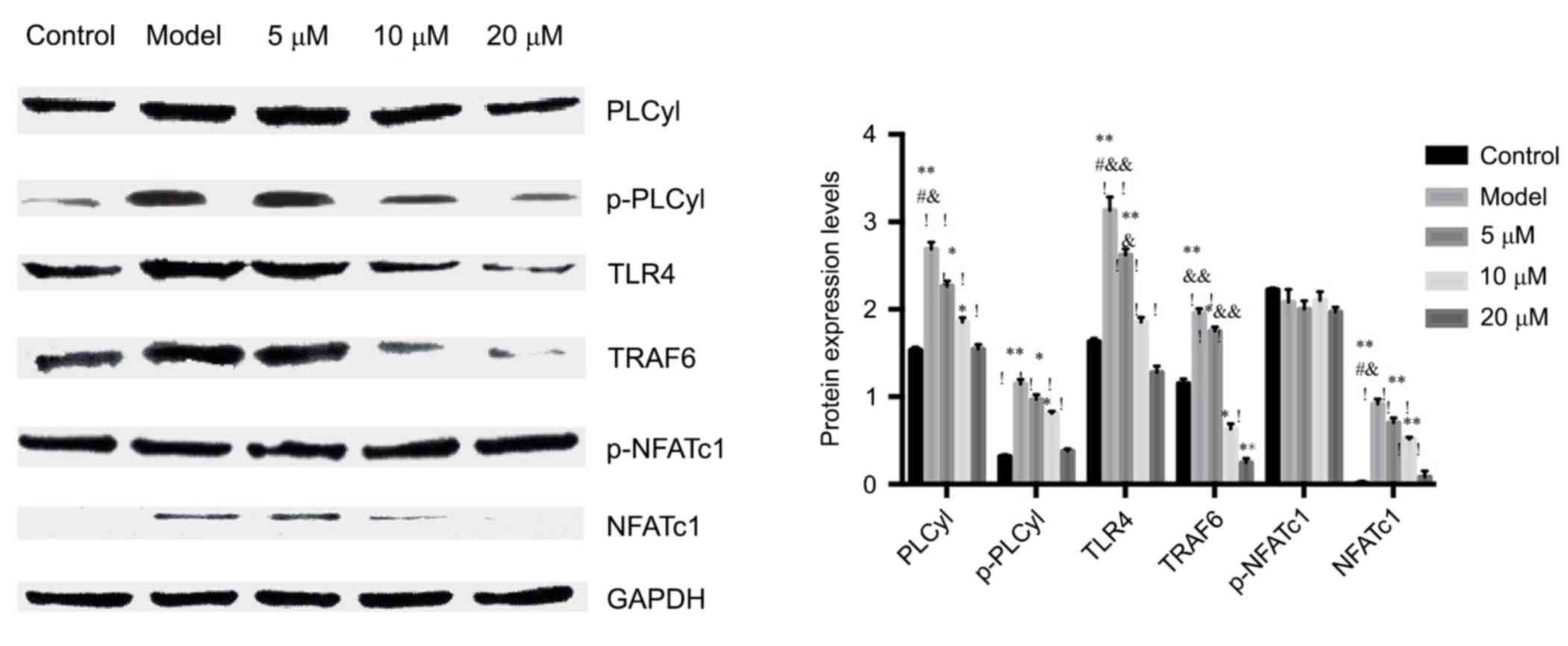|
1
|
Geusens P and Lems WF: Osteoimmimology and
osteoporosis. Arthritis Res Ther. 13:2422011. View Article : Google Scholar : PubMed/NCBI
|
|
2
|
Deal C: Bone loss in rheumatoid arthritis:
Systemic, periarticular, and focal. Curr Rheumatol Rep. 14:231–237.
2012. View Article : Google Scholar : PubMed/NCBI
|
|
3
|
McClung M, Harris ST, Miller PD, Bauer DC,
Davison KS, Dian L, Hanley DA, Kendler DL, Yuen CK and Lewiecki EM:
Bisphosphonate therapy for osteoporosis: Benefits, risks, and drug
holiday. Am J Med. 126:13–20. 2013. View Article : Google Scholar : PubMed/NCBI
|
|
4
|
Schett G and Gravallese E: Bone erosion in
rheumatoid arthritis: Mechanisms, diagnosis and treatmentJ. Nat Rev
Rheumatol. 8:656–664. 2012. View Article : Google Scholar : PubMed/NCBI
|
|
5
|
Tao K, Xiao D, Weng J, Xiong A, Kang B and
Zeng H: Berberine promotes bone marrow-derived mesenchymal stem
cells osteogenic differentiation via canonical Wnt/β-catenin
signaling pathway. Toxicol Lett. 240:68–80. 2016. View Article : Google Scholar : PubMed/NCBI
|
|
6
|
Banks L and Takayanagi H: Immunology and
bone. J Biochem. 154:29–39. 2013. View Article : Google Scholar : PubMed/NCBI
|
|
7
|
Stickeler E and Fehm T: Targeted and
osteo-oncologic: Treatment in early breast cancer: What is state of
the art and what might become so within the next 5 years. Breast
Care (Basel). 9:161–167. 2014. View Article : Google Scholar : PubMed/NCBI
|
|
8
|
D'Amico AV: US Food and drug
administration approval of drugs for the treatment of prostate
cancer: A new era has begun. J Clin Oncol. 32:362–364. 2014.
View Article : Google Scholar : PubMed/NCBI
|
|
9
|
Manolagas SC and Jilka RL: Bone marrow,
cytokines, and bone remodeling. Emerging insights into the
pathophysiology of osteoporosis. N Engl J Med. 332:305–311. 1995.
View Article : Google Scholar : PubMed/NCBI
|
|
10
|
Braun T and Schett G: Pathways for bone
loss in inflammatory disease. Curr Osteoporos Rep. 10:101–108.
2012. View Article : Google Scholar : PubMed/NCBI
|
|
11
|
Okada Y, Lorenzo JA, Freeman AM, Tomita M,
Morham SG, Raisz LG and Pilbeam CC: Prostaglandin G/H synthase-2 is
required for maximal formation of osteoclast-like cells in cultur.
J Clin Invest. 105:823–832. 2000. View
Article : Google Scholar : PubMed/NCBI
|
|
12
|
Barbour KE, Boudreau R, Danielson ME, Youk
AO, Wactawski-Wende J, Greep NC, LaCroix AZ, Jackson RD, Wallace
RB, Bauer DC, et al: Inflammatory markeirs and the risk of hip
fracture: The women's health initiative. J Bone Miner Res.
27:1167–1176. 2012. View Article : Google Scholar : PubMed/NCBI
|
|
13
|
Kim K, Lee SH, Ha Kim J, Choi Y and Kim N:
NFATcl induces osteoclast fusion via up-regulation of Atp6v0d2 and
the dendritic cell specific transmembrane protein (DC-STAMP). Mol
Endocrinol. 22:H6–85. 2008. View Article : Google Scholar
|
|
14
|
Yagi M, Miyamoto T, Sawatani Y, Iwamoto K,
Hosogane N, Fujita N, Morita K, Ninomiya K, Suzuki T, Miyamoto K,
et al: DC-STAMP is essential for cell-cell fusion in osteoclasts
and foreign body giant cells. J Exp Med. 202:345–351. 2005.
View Article : Google Scholar : PubMed/NCBI
|
|
15
|
Bozec A, Bakiri L, Hoebertz A, Eferl R,
Schilling AF, Komnenovic V, Scheuch H, Priemel M, Stewart CL,
Amling M and Wagner EF: Osteoclast size is controlled by Fra-2
through LIF/LIF-receptor signalling and hypoxia. Nature.
454:221–225. 2008. View Article : Google Scholar : PubMed/NCBI
|
|
16
|
Song I, Kim R, Kim K, Jin HM, Youn BU and
Kim N: Regulatory mechanism of NFATcl in RANKL induced osteoclast
activation. FEBS Lett. 583:2435–2440. 2009. View Article : Google Scholar : PubMed/NCBI
|
|
17
|
Wei ZF, Tong B, Xia YF, Lu Q, Chou GX,
Wang ZT and Dai Y: Norisoboldine suppresses osteoclast
differentiation through preventing the accumulation of TRAF6-TAK1
complexes and activation of MAPKs/NF-κB/c-Fos/NFATc1 pathways. PLoS
One. 8:e591712013. View Article : Google Scholar : PubMed/NCBI
|
|
18
|
Asagiri M and Takayanagi H: The molecular
understanding of osteoclast differentiation. Bone. 40:251–264.
2007. View Article : Google Scholar : PubMed/NCBI
|
|
19
|
Costa AG, Cusano NE, Silva BC, Cremers S
and Bilezikian JP: Cathepsin K: Its skeletal actions and role as a
therapeutic target in osteoporosis. Nat Rev Rheumatol. 7:447–456.
2011. View Article : Google Scholar : PubMed/NCBI
|
|
20
|
Broadhead ML, Clark JC, Dass CR, Choong PF
and Myers DE: The apeutic targeting of osteoclast fimction and
pathways. Expert Opin Ther Targets. 15:169–181. 2011. View Article : Google Scholar : PubMed/NCBI
|



















